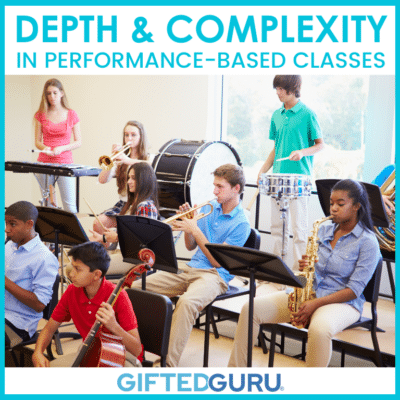I got an email from a member of the Gifted Guru community recently that asked this question:
How can I help teachers understand that just because a child doesn’t understand it right away or without help, they still may need advanced work?
She explained that some teachers she works with believe that if a student doesn’t understand the material right away without assistance, they are not ready for advanced work.
Here’s the point I’m going to try to make in this article:
Just because they don’t understand it unassisted doesn’t mean they don’t need advanced work.
Some teachers seem to believe that if a child cannot be a full autodidact, teaching him- or herself everything without assistance, then that child doesn’t need, and should not be given, advanced work.
Sigh.
Okay, let’s explore this idea a little more deeply.
Where does the misperception come from?
The idea that if you’re truly gifted you won’t need any help arises from this false assumption that we have that gifted means everything comes easily to you, no practice needed.
This is untrue.
I understand why people may think this.
One reason we have this idea floating around is that many gifted kids end up in a corner working alone (often unassisted) on advanced work. Cue my son Jonathan. However, that doesn’t mean that’s the best solution, and it doesn’t mean that if you can’t do that you’re not gifted.
We put gifted kids in the corner with advanced work because, as a society, we haven’t really accepted that they need advanced work. If we keep them in the class with the kids their age and just give them next year’s textbook, we can pretend that they don’t really exist.
One unintended consequence of this practice is the extrapolation of this practice to a universal idea that those who are truly gifted have no real need for instruction.
This is patently false.
Even the most elite of athletes have coaches. Even skilled musicians have teachers.
Another reason for this belief is that the media promote the idea of savant-like behavior on the part of gifted kids. In movies and television shows and books, gifted children often are portrayed as instantly understanding everything put before them. This perpetuates the idea that if you actually have to study or be taught, you can’t really be that gifted.
A third reason is a fundamental misunderstanding about what it means to be gifted, which is part of a larger problem.
Cheryl Friberg, a teacher with twenty-five years’ experience in gifted, says, ‘It’s a misconception among anyone who has not had gifted training: “If you’re gifted you should know it [the content].’ But gifted kids still need to be taught. They just don’t need all the repetitions that go along with it. Teachers will use it against a child. They will say things like, ‘Well, you’re gifted; you should know it.’ But high ability kids still need to be taught.”
[Stay tuned for more from Cheryl in a future article.]
Why gifted children may need help AND advanced work
There are a number of reasons why this is true.
- Giftedness isn’t just already knowing content other students don’t know. While that is one dynamic, another common dynamic is that they learn unknown material faster than typical learners. That creates a couple of issues. They will be frustrated by being forced to move at the same pace as typical learners, even if they start from the same place.
- Advanced work should not be at the mercy of only being available if it can be learned without support. That makes no sense. It says to students, “I’ll take time to teach you the easy stuff, but the more challenging stuff has be able to be learned without me or you don’t deserve to learn it.” Say that out loud to a kid and see what parent email you get.
- Advanced work is not a reward, and the withholding of it should not be used as a punishment. Work at the child’s level is what the student is owed by his/her education. We know from the work of psychologist Mihaly Csikszentmihalyi (pronounced “Chick sent me high”) that optimal learning occurs when we’re slightly above what we can currently do. That’s what leads to a flow experience. Read his book Flow to find out lots more, as I’m oversimplifying, but the idea holds. We don’t want kids doing what they can already do without help. That leads to boredom, not growth.
- Interest drives effort. When students are really interested in something, they’ll work harder at it than we would expect. They will do things we did not think they could do. They may need a little more support, but they can do it. They may need extra practice, but they can do it. If we say, “Nope, unless you can do that without support, you can’t do it,” we shut down interest as well as ability.
- Being gifted does not mean that everything comes easily to you. When teachers harbor that belief, it not only shuts down learning, but it also is part of what leads to imposter syndrome.
It’s kind of like with sports
I mentioned earlier that even elite athletes need coaches.
Imagine a young, promising soccer player. Can you imagine that child’s coach refusing to allow the child to learn more sophisticated skills because she hadn’t come to the team already perfect at keeping an attacker to their weak foot? Can you imagine the coach saying, “Oh, well, if you can’t already do a diving header, I’m not showing you because you should have figured it out yourself”?
No! The coach would make sure she learned the fundamentals she didn’t know while still allowing her to move on to more advanced skills. If there is a skill the coach thinks she could at least try, the coach would give it a shot. Doing so benefits not only the player, but also the whole team.
The same is true for gifted kids in class. If teachers allow gifted students to work to their ability, everyone benefits, including the teacher.
Wrapping Up:
I have sympathy for teachers who are thrown into classrooms with gifted kids with insufficient training. I have sympathy for not understanding their needs intuitively. Hopefully, this article will help those who have believed that support and advanced work can’t coexist begin to believe otherwise.
Even highly able students need teachers, which is good news for teachers. It means that even those students who are capable of very advanced work can still benefit from us.
Let’s keep our minds open to the idea that being gifted doesn’t mean going it alone in school or risk being forced to stay at a level far below that which you are capable of.
You May Also Like:
- Begin With the Highest Level Learner in Mind
- 6 Reasons Why PBIS is a Terrible Idea
- Differentiation Advice: Teacher to Teacher
Would you like to receive my free monthly newsletter? Sign up and receive a free guide for helping gifted children thrive in school.

Note: Sometimes I use affiliate links, which means that if you click through and buy something, I get a few pennies (to buy more books!). It will never cost you anything extra.






